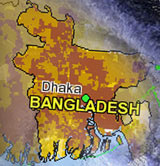Voting in Bangladesh landmark elections begins with festivity
 Dhaka - Voting in Bangladesh's landmark elections began Monday in a festive mode to bring the country back to a democratic system after almost two years of emergency rule.
Dhaka - Voting in Bangladesh's landmark elections began Monday in a festive mode to bring the country back to a democratic system after almost two years of emergency rule.
Enthusiastic people were seen waiting on long queue at polling stations from daybreak to cast their vote as balloting began at 8 am amid tight security.
The voting will continue until 5 pm, election officials said.
Bangladesh's chief adviser to army-backed interim government, in a television address to the nation, called upon the political parties to accept the people's verdict and electors to choose honest and competent representatives to parliament.
The election is taking place in 299 out of 300 parliamentary constituencies as the Election Commission earlier postponed polling in one area following the death of a candidate.
Chief Election Commissioner ATM Shamsul Huda said he hopes for a credible election to return the country to democracy.
In a televised speech Sunday, he assured all necessary preparations for a free and fair election, inviting all to apply their voting rights without fear.
"I'm inviting all voters, regardless of political differences, to go to polling centres, taking the opportunity of the secure environment to cast their invaluable votes," the CEC said.
The government deployed huge contingents of law enforcers across the country for election security. As many as 650,000 lawmen, including army troopers, fanned out across Bangladesh to maintain order prior to, during and after the elections.
The counting of election results will begin within an hour after the closing of vote casting.
The government earlier announced a pubic holiday to facilitate voters to exercise their right to franchise.
Bangladesh's general election was originally scheduled in January 2007. But it was postponed following promulgation of a state of emergency in the wake of political violence, suspending all civil and political rights on January 11, 2007.
Bangladesh Nationalist Party chief and two-time former prime minister Khaleda Zia stepped down at the end of her five-year term on October 28, 2006, handing over power to President Iajuddin Ahmed, who headed A caretaker government to conduct the polls.
Failing to conduct the polls with the Awami League led alliance boycotting, Iajuddin reportedly instigated by the military promulgated the state of emergency that followed formation of another interim government headed by Fakhruddin Ahmed on January 12, 2007 to prepare ground for credible elections.
The emergency was lifted on December 17, 2008 to allow the people to cast their votes freely. (dpa)